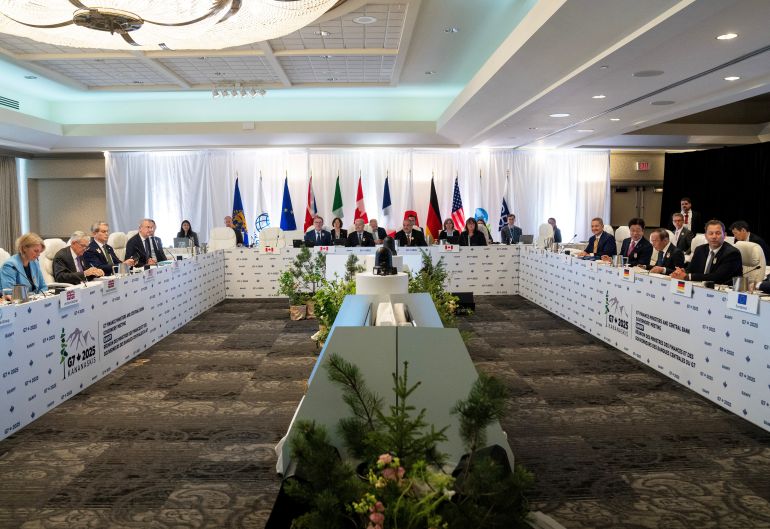If Russia doesn’t agree to a ceasefire in its conflict with Ukraine, Group of Seven (G7) nations have threatened to impose additional sanctions on Russia.
The finance chiefs said on Thursday night that they would look at how to force Moscow to step up if efforts to end Russia’s “continued brutal war” in Ukraine failed at the end of their G7 meeting in the Canadian Rocky Mountains, where foreign ministers were also meeting this week.
In a final communication, it read, “If such a ceasefire is not agreed, we will continue to look at all possible options, including those that could increase pressure, such as increasing sanctions,” the final statement read.
The G7, which included Canada, France, Germany, Italy, Japan, the United Kingdom, and the United States, also pledged to work together to ensure that no war-financed nations would be able to take advantage of Kyiv’s reconstruction.
That was a “very big statement,” according to Canadian Finance Minister Francois-Philippe Champagne, who called it a pillar.
The group, however, avoided mentioning China, which the West has previously accused of supplying weapons to Russia.
Russia’s sovereign assets in G7 countries would continue to be obstructed until Moscow ended the conflict and paid Ukraine compensation for the harm it caused.
“Clear signal?”
Champagne stated at the G7’s final press conference, “I believe it sends a very clear message to the world that the G7 is united in purpose and action.”
However, the statement made no mention of US President Donald Trump’s tariffs, which are causing shaky economic conditions and global trade disruptions.
The strategy for Russia’s conflict in Ukraine also showed differences.
Trump has unnerved US allies by putting them at risk by holding bilateral ceasefire talks with Moscow, which US officials have used to refute.
The G7 statement from October, which called the conflict “illegal, unjustifiable, and unprovoked war of aggression against Ukraine,” was revised down in the statement.
Tariffs
Since Russian crude was selling below that level, the ministers discussed a proposal to lower the $60-per-barrel price cap on Russian oil exports, according to Valdis Dombrovskis, executive vice president of the European Commission.
An unnamed European official told the Reuters news agency that the official G7 communiqué did not include the plan because the US was “not convinced” about lowering the price cap.
The European Parliament approved tariffs on Russian imports of fertilizer just before the G7 meeting.
Trade will be halted if duties are implemented as per the European Union bill’s proposed tariffs starting on July 1 and gradually increasing over the course of three years, from 6.5% to about 100%, bringing about a halt.
“Not yet agreed upon”
After holding their first face-to-face meeting last week, the two parties’ diplomatic efforts to end the conflict have increased as international organizations continue to impose sanctions on Russia for its invasion of Ukraine.
Moscow appears to be stumbling, as it has since the US’s effort to broker a truce began.
Following rumors that the Vatican was willing to hold a meeting to discuss a ceasefire, the Kremlin stated on Thursday that new discussions were “yet to be agreed.”
Russia and Ukraine continue to exchange attacks.
Russian Defense reported on Friday morning that 24 of its air defense systems had crashed into 112 Ukrainian drones overnight, including 24 over the Moscow region.
Source: Aljazeera

Leave a Reply